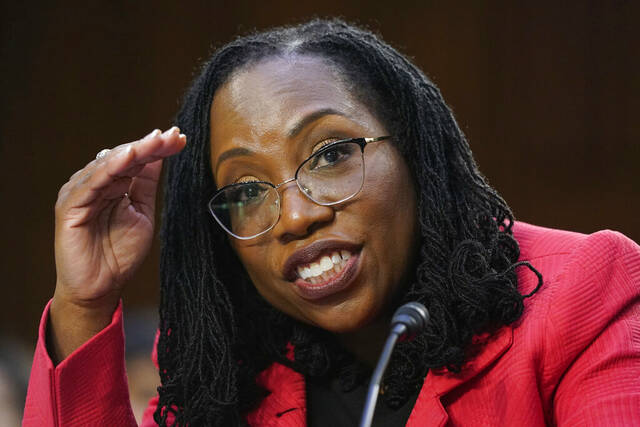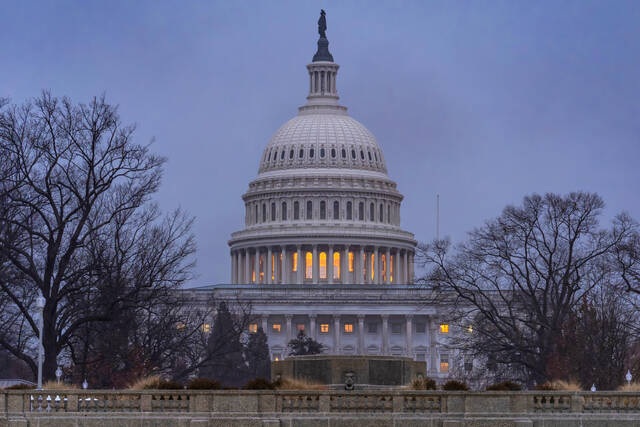Legal experts expect Supreme Court nominee Ketanji Brown Jackson’s confirmation hearings to go smoothly this week, based on her credentials and the fact that her appointment wouldn’t shift the ideological makeup of the high court.
“She is clearly one of the most qualified candidates to come before the Senate in quite some time,” said Jerry Dickinson, a constitutional law professor at the University of Pittsburgh and a Democratic congressional candidate in Pennsylvania’s newly created 12th District.
Jackson, who currently sits on the U.S. Court of Appeals for the District of Columbia Circuit, served as a U.S. district judge in Washington, D.C., for eight years before that. She would be the first Black woman to serve as a Supreme Court justice.
Her two previous judicial appointments required Senate confirmation, in 2013 and last year. She received bipartisan support both times.
That doesn’t mean this confirmation vote won’t be split down party lines, given the deeply divided political climate. Jackson must be confirmed by a simple majority. A tie vote would be broken by Vice President Kamala Harris.
“Of course, politics is going to play a role. It always plays a role,” said Harry Litman, who served as a law clerk to Supreme Court Justice Thurgood Marshall and later as U.S. attorney for the Western District of Pennsylvania.
Bruce Antkowiak, a former federal prosecutor who teaches at Saint Vincent College, said the confirmation process has always been a forum for senators to make their own political points that have nothing to do with the particular nominee.
“Because it gets widespread media coverage, people can’t resist the urge to grab the megaphone and reach as many people as they can,” Antkowiak said.
During Monday’s hearing, several Republican senators in their opening statements addressed issues not related to Jackson’s qualifications or experience, including transgender athletes and critical race theory.
Litman said specific criticisms of Jackson were limited.
“I thought her prospects were looking a little brighter after (Monday),” Litman said.
President Biden nominated Jackson in February to replace retiring liberal Justice Stephen G. Breyer. Her appointment would maintain the court’s 6-3 conservative majority.
Jackson graduated from Harvard Law School and previously worked as a federal public defender and served on the U.S. Sentencing Commission.
Dickinson has studied Jackson’s opinions and said she is a master of law. She has the ability to convey clear answers to complex legal questions and has a reputation for having a good temperament on the bench.
“She comes with a level of even-handedness and fairness,” Dickinson said. “I think she’s extremely pragmatic in her approach.”
Because she has been confirmed by the Senate twice in the past, Antkowiak said, senators this week will have to take a different tack than attacking Jackson’s credentials.
He does not expect her hearings to have the same level of hostility as those of Justice Brett Kavanaugh in 2018.
Antkowiak, who also graduated from Harvard Law, said Jackson comes into the process without any controversy or allegations against her.
“This nominee is a mainstream jurist who has already been intensely vetted,” he said.
“I don’t anticipate anything ugly or dirty, not because they’re above that, but there’s just nothing there,” Litman said. “I think she gets out of committee this week.”
Ken Gormley, a constitutional law scholar and president of Duquesne University, said he expects Jackson’s hearings to resemble those of Justice Neil Gorsuch in 2017.
As is the case now, Gorsuch’s appointment was not going to shift the majority, and he also had a solid, distinguished record.
“It wasn’t worth having a vicious attack,” said Gormley, who also graduated from Harvard Law. “There wasn’t as much at stake.”
Because of the historic nature of Jackson’s nomination, Dickinson, who has two young, Black daughters, believes that Republicans in the Senate will give deference to that and ultimately let the process play out.
“Why make it more difficult than it needs to be?” he asked.
Jackson joining the court would bring a level of diversity it hasn’t seen before, Dickinson said.
“I also think it goes to the need for diversity and inclusion in the legal profession,” he said. “That shapes the way people see the legal profession.”
More diverse representation translates to more equitable results, Dickinson said.
“You really do want the country to have faith in the highest court of the land — that it looks like the country,” Litman said. “The currency of the court really is public confidence, and that confidence has diminished of late.”
Gormley said the confirmation process over the past few decades has become sullied and not what the framers intended.
Under the Constitution, he said, the president is to select the justices for the Supreme Court and the Senate is limited to give “advice and consent.”
“People forget what their role is in the Senate,” Gormley said, calling recent hearings “media spectacles.”
“(The authors of the Constitution) certainly didn’t intend this. It’s really incumbent on both parties to clean up their act and identify if there’s a serious defect in the qualifications of the nominee,” he said. “The sad truth is, 98% of senators probably made up their minds on how they would vote before this nominee was ever announced by President Biden.”
Despite the deep partisan divide, Gormley thinks it’s possible that Jackson will pick up some Republican votes.
“It’s hard to work up a good dislike for her,” Gormley said. “She’s just a calm, lovely, qualified person.”
In her opening statement Monday, Jackson acknowledged God, her parents and her children, Gormley said. She appeared to be graceful and calm.
“How do you really attack that? It was genuine,” he said.
Antkowiak agreed, saying that with Jackson’s qualifications, the burden will shift to the senators voting no to articulate their reasons why.
“It will be very difficult for anyone to make a strong and cogent argument why this person should not be on the Supreme Court,” he said.








